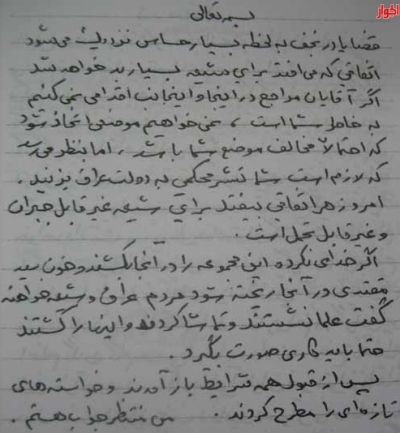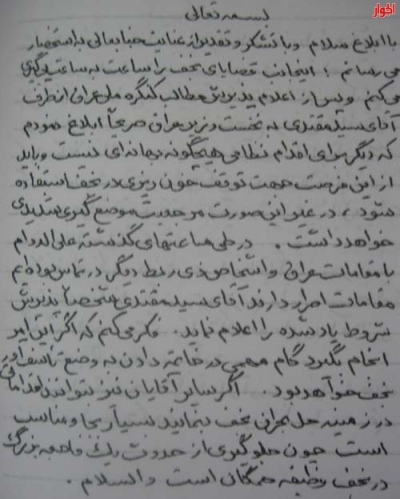The book “Ayatollah Sistani’s Medical Trip and Najaf Crisis” by Haj Hamid Khaffaf presents many documents worth of publishing including the confidential correspondences between Iranian Supreme Leader Ayatollah Ali Khamenei and Ayatollah Sistani, one of the most significant of which is a letter written by Ayatollah Khamenei to Ayatollah Sistani regarding the clashes between U.S forces and Iraqi army from one hand, and between the Iraqi Army and Al-mahdi militants of Al-sadr movement form the other when Ayad Allawi was the Prime Minister of Iraq.
Ijtihad Network: In his book “Ayatollah Sistani’s Medical Trip and Najaf Crisis”, Haj Hamid Khaffaf offers fascinating details concerning different aspects of the Ayatollah’s medical trip to London in 2004. The book presents many documents worth of publishing including the confidential correspondences between Iranian Supreme Leader Ayatollah Ali Khamenei and Ayatollah Sistani, one of the most significant of which is a letter written by Ayatollah Khamenei to Ayatollah Sistani regarding the clashes between U.S forces and Iraqi army from one hand, and between the Iraqi Army and Al-mahdi militants of Al-sadr movement form the other when AyadAllawi was the Prime Minister of Iraq.
What follows is the full content of the letter by Ayatollah Khamenei:
In the Name of the Most High
The situation in Najaf is getting into a very critical moment. What is expected to come out of it would be a very huge below to Shias. Our (me and the Grand Ayatollahs here in Iran) not taking any action is because of you; we don’t wish to take a stand which might be contrary to yours. However, it appears that you need to severely censure the Iraqi government for its activities in this regard. If, Allah forbidden, members of the movement are killed and the Sayyed Muqtada’s blood is shed there, Iraqi people and Iraqi Shias would say that the Ulama (the mullahs) remained inactive and let them got killed. Something must be done. While all of their conditions have been accepted, they recently came and offered new requests. Looking forward to your reply.
“It was evening when Shaikh Akhtari called from Tehran and delivered the Ayatollah’s letter over the phone and Sayyed Muhammad Reza Sistani (son of Ayatollah Sistani) wrote it down word by word”, writes Haj Hamid Khaffaf in this regard.
Another document published by Haj Ahmad Khaffaf is Ayatollah Sistani’s reply to the letter. “Grand Ayatollah Sistani carefully read the letter and wrote a reply in an hour. Sayyed Sayyed Muhammad Reza Sistani called Shaikh Akhtari and delivered the reply over the phone which was written down by Shaikh Akhtari word by word”, said Hamid Khaffaf.
The full content of the Ayatollah’s reply is as follows:
In the Name of the Most High
With greetings and appreciation of your care, I would like to inform you that I am following what is going on in Najaf hourly. When it was declared that Sayyed Muqtada had accepted the conditions set by the Iraq’s national congress I clearly told Iraqi Prime Minister that there remained no pretext at all for any military action and the opportunity must be used to stop bloodshed in Najaf or the Iraq’s Shia authority would take an extreme positions against you.
I have constantly been in touch with Iraqi officials and other relevant individuals over the last few hours. The officials are insisting that Sayyed Muqtada himself declare that he has accepted the conditions. I think that would be a very important step in terminating such a miserable situation in Najaf. It would be fairly appropriate if other Ayatollahs are able to do something to help resolve the crisis in Najaf, as it is incumbent upon all people to help prevent a major crisis in Najaf.
 Ijtihad Network Being Wise and Faithful Muslim in the Contemporary World
Ijtihad Network Being Wise and Faithful Muslim in the Contemporary World
